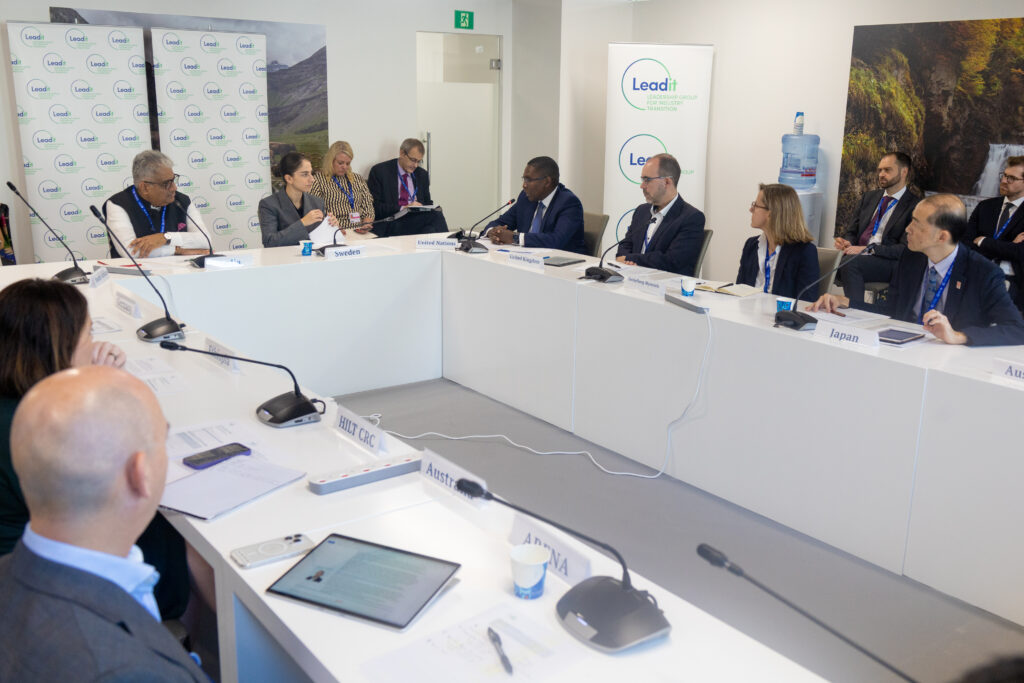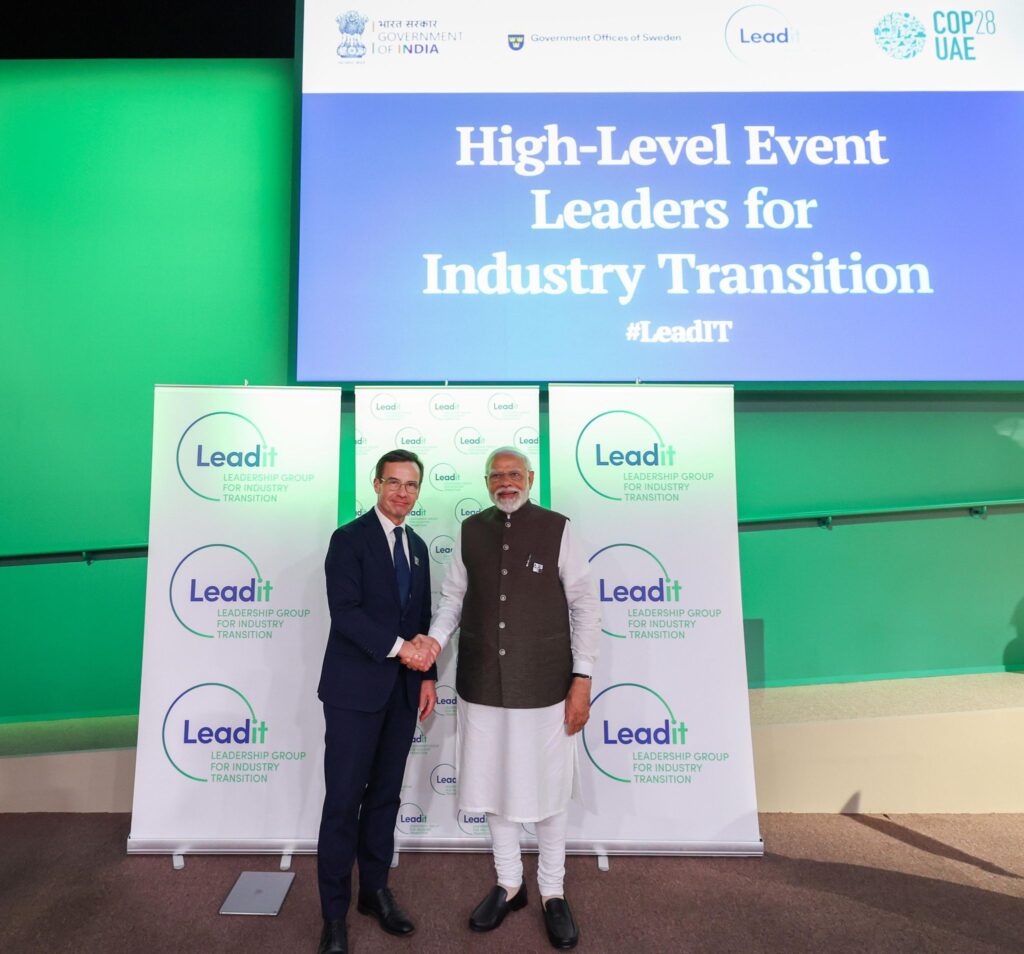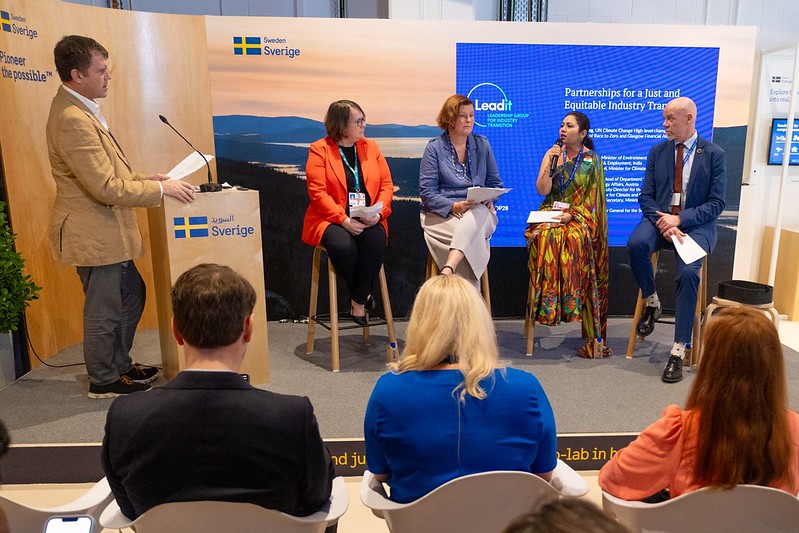LeadIT 2.0 launched at COP28: driving inclusive industry transition forward.
At COP28, the Leadership Group for Industry Transition (LeadIT) initiated its second phase, LeadIT 2.0, marking a joint commitment by member countries and companies to shape policy frameworks and international cooperation for an inclusive industry transition.
LeadIT’s three-year Mission Statement, adopted at the annual LeadIT Summit at COP28, outlined the group’s strategic direction for the next phase which will focus on global dialogue, technology collaboration, and fostering industry transition partnerships.
Read the Mission Statement
LeadIT 2.0 Mission Statement
Selwin Hart, Special Adviser to the Secretary-General on Climate Action and Just Transition expressed his full support for LeadIT 2.0 at the LeadIT Summit on behalf of the UN Secretary-General. He encouraged LeadIT to intensify its efforts in supporting credible transition plans and fostering a conducive policy environment. “LeadIT is delivering on several fronts. The industry transition must be just and equitable with particular attention paid to the needs and interests of the developing world.”
LeadIT 2.0: pioneering collaborative industry transition platforms
At the Summit, India, Sweden and the UK acknowledged LeadIT’s role in supporting the development of the India-Sweden Industry Transition Platform as well as the Brazil-UK Industrial Decarbonization Hub, citing them as guiding examples for strengthening North-South cooperation on industry transition.
"LeadIT is delivering on several fronts. The industry transition must be just and equitable with particular attention paid to the needs and interests of the developing world.”
Selwin Hart
Special Adviser to the Secretary-General on Climate Action and Just Transition
The India-Sweden Industry Transition Platform (ITP) was announced at the ‘Leaders for Industry Transition’ event at COP28 by Indian Prime Minister Narendra Modi and his Swedish counterpart Ulf Kristersson along with LeadIT 2.0. With the support of LeadIT, the India-Sweden ITP will connect the governments, industries, technology providers, researchers, and think tanks of the two countries as well as provide tailored bilateral and multilateral technical and financial cooperation for India’s transition priorities.
At the event Prime Minister Kristersson spoke of the shared commitment of LeadIT 2.0 and the India-Sweden Industry Transition Platform: “We have decided to collaborate to strengthen relevant institutions and policy frameworks to co-develop technology, to collaborate on research and innovation, and to mobilize investments in the transition”.
“We have decided to collaborate to strengthen relevant institutions and policy frameworks to co-develop technology, to collaborate on research and innovation, and to mobilize investments in the transition”.
Ulf Kristersson
Prime Minister of Sweden
Prime Minister Modi expressed optimism about future impact: “A new chapter is beginning with the launch of LeadIT 2.0. I believe, together we will be successful in writing a new green growth story for the future generation.”
In a joint statement, the leaders committed to delivering clear and tangible results from the partnership by COP30 in 2025.

Following the announcements of the prime ministers, a high-level panel comprising LeadIT company members and partners shared their insights.
Tariye Gbadegesin, incoming CEO of the Climate Investment Fund (CIF), remarked on the alignment of their objectives with LeadIT’s. “We’re excited to be able to contribute to this work scaling up clean energy, resilience, and decarbonization.”
Dalmia Cement CEO Mahendra Singh highlighted the importance of a just energy transition, focusing on collective responsibility.
Martin Pei, SSAB’s Executive Vice President and CTO, shared their success in developing fossil-free steelmaking and the urgency to scale up this technology.
LeadIT 2.0 COP28 side event emphasized role of finance and collaboration for real-world projects
The COP28 side event ‘Partnerships for a just and equitable industry transition’ on 10 December provided a deeper insight into the objectives of LeadIT 2.0.
Romina Pourmokhtari, Minister for Climate and Environment of Sweden, reminded attendees of the opportunities that come with decarbonization and a green transition and emphasized that LeadIT will help foster partnerships between frontrunners and ambitious economies that wish to align their industry with the goals of the Paris Agreement.
Bhupender Yadav, Minister of Environment, Forest and Climate Change and Labour and Employment, highlighted that the real transition challenges of technology transfer and finance are yet to be addressed. He stressed the necessity for collaborative international mechanisms aimed at facilitating cooperation on technology.
A panel discussion involving key stakeholders delved into methods to accelerate an inclusive industry transition.
Ruchika Drall, Deputy Secretary at India’s Ministry of Environment, Forests, and Climate Change, pointed out that 70 percent of India´s built environment is going to be developed in the next decade, emphasizing the pertinent role of partnerships like the India-Sweden ITP to mobilize innovators, financiers, and technology providers to accelerate a green transition of the steel and cement sector. She underscored India’s ambition to source finance for green investments from diverse channels, including Multilateral Development Banks, bilateral agreements, cooperation assistance, government financing, and private investment.
Robert Andrén, Director General of the Swedish Energy Agency, stressed the value of linking companies in India and Sweden to drive technological innovation. The event featured a video demonstrating tangible results from such matchmaking, showcasing the joint efforts of LeadIT members SaltX and Dalmia Cement that are to develop India’s first pilot plant for electric cement production powered by renewable energy.
Mathilde Mesnard, Deputy Director and OECD Coordinator for Climate and Green Finance within the Environment Directorate, highlighted the vital role of knowledge-sharing platforms in scaling up investments and fostering global cooperation.
Elfriede-Anna More, Head of the Department for International Climate, Environment, and Energy Affairs, Austria, echoed this sentiment and called for strengthened collaboration between LeadIT and Mission Innovation led by Austria and Australia to share knowledge and support green demonstration projects. In addition, she emphasized the value of robust governance and regulatory frameworks at the national and regional levels to attract investment in low-carbon technology and renewable energy to decarbonise sectors like steel and cement.

Concluding the event, Nigel Topping, Former UN Climate Change High-level Champion from the COP26 Presidency, repeated the point that much of the investment is going to happen in emerging markets and that we need to get decarbonization right all over the world. Summing up, he underscored the importance of collaboration and finance to support emerging markets, real projects driving collaborations, and finding a balance between competitiveness and collaboration in the transition.
Looking ahead
As COP28 draws to a close, the launch of LeadIT 2.0 and pioneering industry transition partnerships stands as a testament to the global commitment towards a just and equitable industry transition. The insights and commitments shared at LeadIT COP28 events reflect a collective resolve to overcome challenges and seize opportunities in the journey towards a greener, more sustainable industrial landscape.
"A new chapter is beginning with the launch of LeadIT 2.0. I believe, together we will be successful in writing a new green growth story for the future generation."
Narendra Modi
Prime Minister of India
The Leadership Group for Industry Transition (LeadIT) was launched by the Prime Ministers of Sweden and India at the UN Climate Action Summit in 2019 and is supported by the World Economic Forum (WEF). LeadIT brings together 18 countries and 20 companies dedicated to achieving net-zero emissions from industry by 2050. The LeadIT Secretariat is hosted by the Stockholm Environment Institute (SEI).

